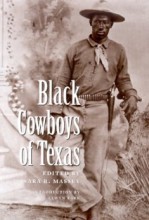Sara Massey's book is a collection of twenty-five biographical sketches written by as many writers. Chapter One, "Cowgirls and Cattle Queens" written by Joyce Roach.
Black Cowboys of Texas Reviews
Never-told-before stories of the ways things were for black cowboys ( and cowgirls) make this book worth a look. Whether your interest is in anything Texan, cowboys in general, or African Americans, I recommend this book to you. An ensemble cast of authors has given us detailed and personal looks into the fascinating and largely unknown lives of black cowboys. The writers bring the characters affectionately to life with stories as told to them and rich descriptions of the experiences of the black cowboys. It was a hard life, but not one devoid of humor and satisfaction. This collection brings the reader a panorama of lively characters and tales as wide as Texas itself, and makes a worthy contribution to cowboy romance and lore. Carol Lane
I had no idea that there were so many black cowboys and cowgirls before I read this book. Many black cowboys/girls are reviewed in the book and each has his/her own, fascinating story. It is an extremely interesting book and I highly recommend it to everyone. John MacDonald
Thesis: Black cowboys have been avoided and left unseen in the history of Texas and ranching in the western United States though their contributions have been vital to the development of ranches, towns and settlements scattered throughout Texas.
Content: The Civil War left old men, women, children and slaves to tend the daily necessities of farm and ranch life in the South. The same was true in Texas. Leaving cattle-tending responsibilities to slaves many were able to master the duties of the cow-puncher. With no barbed-wire to delineate pasture and keep herds together, cattle roamed wild. Left unchecked the cattle population exploded. Though slaves were charged with cattle-tending they were not allowed firearms to protect themselves from predators or hostile Native Americans.
During Reconstruction Texas cattlemen had two issues to address. The first problem was expounded by the second. With cattle populations growing unchecked through the war years there were far too many cattle for local markets. Cattle would have to be driven up trials to railheads to be shipped to eastern markets. Money was to be made, but getting the cattle to market was a difficult issue to surmount.
The second problem for ranchers was that emancipation had removed their workforce. The shortage of labor, especially the shortage of skilled cow hands was answered by newly free blacks, who had gained experience cattle-tending since before the years of the Republic. These men were generally assigned the more dangerous tasks of breaking broncos. They were commonly paid at a lesser rate than their white counterparts, but there were exceptions of equal pay. Frequently cattlemen would even pay their cowboys in cattle. Through these opportunities of receiving cattle for work many African-Americans were able to amass large herds of their own.
Critique: Sara Massey's book is a collection of twenty-five biographical sketches written by as many writers. They range in content and quality from expanded obituaries to in-depth biographical essays illustrating one man or woman's contributions. Each article illustrates the important role African-Americans had in the settlement and development of Texas and ranching through the life experiences of diverse individuals. Each of the twenty-five lives examined illustrate different experiences and contributions of African-Americans to the settlement of Texas and development of the cattle industry in the west.
B. L. Clark

